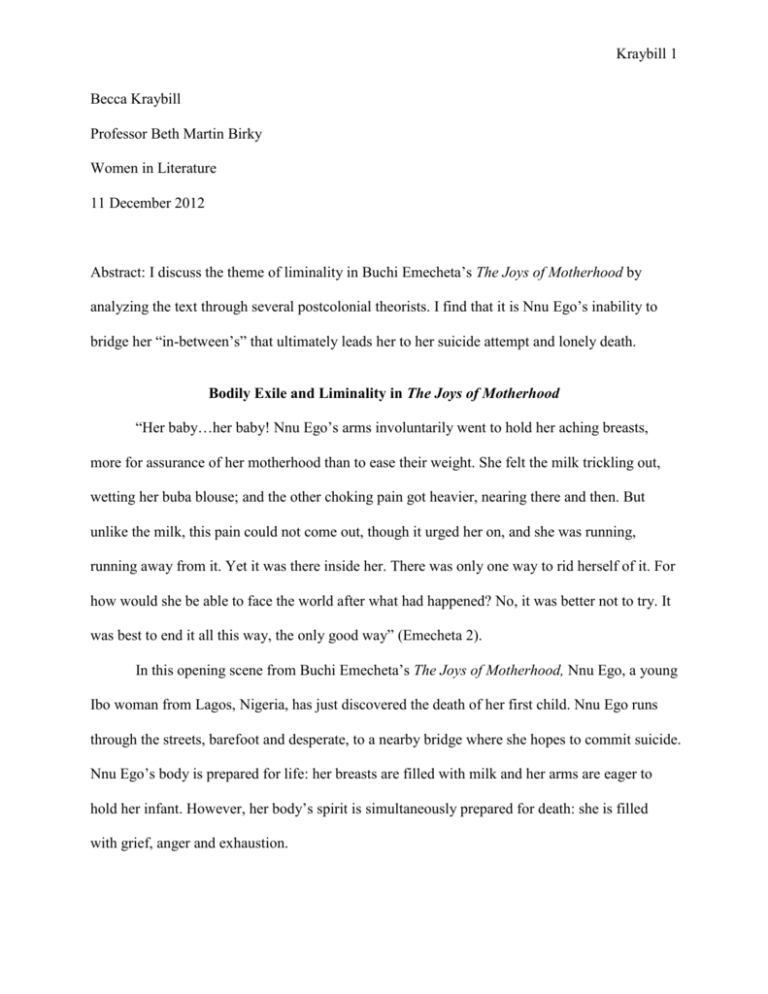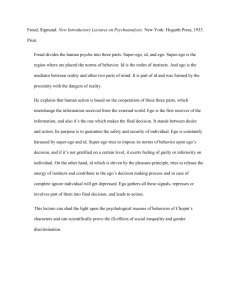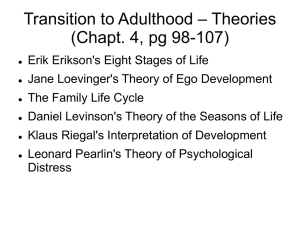Bodily Exile and Liminality in The Joys of Motherhood
advertisement

Kraybill 1 Becca Kraybill Professor Beth Martin Birky Women in Literature 11 December 2012 Abstract: I discuss the theme of liminality in Buchi Emecheta’s The Joys of Motherhood by analyzing the text through several postcolonial theorists. I find that it is Nnu Ego’s inability to bridge her “in-between’s” that ultimately leads her to her suicide attempt and lonely death. Bodily Exile and Liminality in The Joys of Motherhood “Her baby…her baby! Nnu Ego’s arms involuntarily went to hold her aching breasts, more for assurance of her motherhood than to ease their weight. She felt the milk trickling out, wetting her buba blouse; and the other choking pain got heavier, nearing there and then. But unlike the milk, this pain could not come out, though it urged her on, and she was running, running away from it. Yet it was there inside her. There was only one way to rid herself of it. For how would she be able to face the world after what had happened? No, it was better not to try. It was best to end it all this way, the only good way” (Emecheta 2). In this opening scene from Buchi Emecheta’s The Joys of Motherhood, Nnu Ego, a young Ibo woman from Lagos, Nigeria, has just discovered the death of her first child. Nnu Ego runs through the streets, barefoot and desperate, to a nearby bridge where she hopes to commit suicide. Nnu Ego’s body is prepared for life: her breasts are filled with milk and her arms are eager to hold her infant. However, her body’s spirit is simultaneously prepared for death: she is filled with grief, anger and exhaustion. Kraybill 2 In a society where motherhood is valued and expected, Nnu Ego’s impulse for suicide is an embodied response to her inability to bear a child. Nnu Ego’s body is placed in an ironic position: either she can bear children and face the bodily pain of poverty, or not bear children and face the spiritual and cultural pain of non-mothering. Following a common theme for women in postcolonial literature, Nnu Ego both experiences and resists liminality through her body. In Homi K. Bhaba’s “The Location of Culture,” Bhaba discusses the concept of liminality, rooting his research in the theories of anthropologists Victor Turner and Arnold van Gennep. Van Gennep first proposed that a phase of liminality, or ambiguity, occurs when the self transitions from one status to another via ritual. In a liminal stage, the self must disengage from the past if hoping to move on to the next stage, thus forming a sense of in-betweenness. Turner expands van Gennep’s research by identifying three stages of the transition: preliminal, liminal and postliminal (Kalua 3). Turner writes that liminality is the moment “when the past has lost its grip and the future has not yet taken definite shape” (24). Bhaba adapts the theory of liminality by applying it to the postcolonial context. He describes liminality as “the emergence of the interstices—the overlap and displacement of domains of difference—that the intersubjective and collective experiences of nationness, community interest, or cultural value are negotiated” (Bhabha 2). Thus Bhaba’s definition describes liminality as a similar state of in-betweenness as Turner and van Gennep, in which the self can either return to the old identity or move on to the new identity. However, Bhaba marks the postcolonial liminality as unique in that the liminal self is formed within the context of a colonized state or nation (7). Because of this, the self becomes subject to a variety of forces: the colonizer, a new language, emotional and physical domination, new land control or borders and issues of “old” vs. new” traditions. Bhaba makes it clear that this Kraybill 3 state of liminality, or “hybridity,” for a postcolonial self can be overwhelming and damaging because the “borders” of identity are inherently unclear (1). Bhaba writes, “Space and time cross to produce complex figures of difference and identity, past and present, inside and outside, inclusion and exclusion. For there is a sense of disorientation, a disturbance of direction, in the ‘beyond’ (2). The liminal, postcolonial self therefore has an added element of identity crisis. Ketu H. Katrak, author of “Politics of the Female Body” argues that the liminality experienced by the postcolonial self is especially strong for women within a postcolonial setting (2). Katrak adds an additional element by recognizing the power of the female body to represent the colonized state and nation. By analyzing texts by postcolonial women writers, Katrak concludes that the bodies of postcolonial women are often put in or represent a “state of exile” (2). The exile includes “self-exile and self-censorship outsiderness, and un-belonging to itself within indigenous patriarchy, strengthened by British radicalized colonial practices in the regions of India, Africa and the Caribbean” (3). Katrak identifies bodily exile as evident in postcolonial literary women through English education socialization, motherhood and cultural traditions (2). Katrak defines an “internalized exile” as an exile in which the body “feels disconnected from itself, as though it does not belong to it and has no agency” (2). A more outward bodily exile, then, according to Katrak, would be the implications of “forgetting one’s native language and cultural ways supplanted by English language and mores; or from breaking ‘tradition’; or for resisting the patriarchal authority of fathers and husbands” (2). Regardless of whether the exile is of the inner or outer type, Katrak argues that exile leads the postcolonial woman to a position of liminality (1). Though Katrak is not afraid to associate the term with Turner’s theory, she offers an additional definition. She describes liminality as “a space for the female protagonist to cope with, and at times, transcend exile” (2). Kraybill 4 Katrak hints that though liminality through exile can be transcended--- as Turner and van Gennep imply marks the completion of transition---exile can also dominate and destroy the self. Though some postcolonial subjects can transcend their exile, by the finale of The Joys of Motherhood, Nnu Ego is ultimately dominated by her liminality. As she prepares to jump off the bridge, Ato, her childhood friend, shouts at her, “Nnu Ego, the daughter of Agbadi, what has gone wrong with you? All because you lost a child? (Emecheta74)” Ato hints that the loss of motherhood is conquerable; that it is just one sorrow to be integrated into life’s hard realities. However, Nnu Ego’s loss has moved far beyond a place of “moving on.” The loss stings from the complex layers of forces that Baba describes makes up postcolonial liminality. As Salome Nnoromele, author of "Representing the African Woman: Subjectivity and Self in The Joys Of Motherhood” writes, “for reasons that the novel consistently interrogates, Nnu Ego cannot move on” (183). Nnoromele suggests that the The Joys of Motherhood as a whole “becomes an elaborate exploration of what went wrong with Nnu Ego” (183). Stephane Robolin, in her essay “Gendered Hauntings: The Joys of Motherhood, Interpretive Acts, and Postcolonial Theory,” implies that Nnu Ego’s destruction, then, comes from her position of liminality because she is “positioned at the conjunction of multiple and compounding interstices that give rise to her increasing dilemmas and dis-ease” (Robolin 80). Nnu Ego experiences liminality through her motherhood, chi hauntings and position between both Lagos and Izba. First, Nnu Ego experiences liminality through the pressures of motherhood. Motherhood is stressed as significant as early as the second chapter, in which Ona, Nnu Ego’s mother, dies. Before Ona dies, she begs Agbadi, Nnu Ego’s father, to let Nnu Ego “have a life of her own, a husband if she wants one.” Ona asks him to allow his daughter to “be a woman” (Emecheta 26). Kraybill 5 Already, the standard of womanhood is set as equivalent to a life in which a man and family are present. Nnu Ego grows to be a young woman and she marries Amatokwu. However, here Nnu Ego faces a second pressure of womanhood, in that she is unable to conceive. She feels a deep, restless grief, “She knew that soft liquid feeling of motherhood was lacking…many a night she cried tears of frustration and hopelessness” (31). But the consequences of infertility extend beyond an emotional impact. In a culture where multiple-wives support one man with children and resources, her childlessness is seen as incompetent. When her body cannot meet the standard of production, Nnu Ego is sent away to Lagos to another husband. Meanwhile, Amatokwu lets her go willingly, scoffing, “She is as barren as a dessert” (39). Nnu Ego’s new life with her new husband, Nnaife, begins and she finally becomes pregnant. At the birth of her son, she expresses a fulfillment in her life, saying, “She was now sure, as she bathed her baby son and cooked for her husband, that her old age would be happy, that when she died there would be somebody left behind to refer to her as ‘mother’” (57). However, this nostalgia and security ends shortly when Nnu Ego returns one afternoon to find her infant dead. In the next chapter, driven by her grief, she rushes to a bridge to end her life. The title of the bridge chapter, “A Failed Woman,” suggests in itself the stage in Nnu Ego’s life where she still has not accomplished her purpose in society to bear children. In the final stage of Nnu Ego’s pressure of womanhood, she does bear child---but too many. Nnaife is conscripted to war and leaves behind Nnu Ego to care for several children. She is overwhelmed with the chores of single motherhood---chopping wood, running a business and finding food and education for the children. Poverty eventually wears her thin and she cries, “God, when will you create a woman who will be fulfilled in herself, a full human being, not Kraybill 6 anybody’s appendage?” (152). Her children move to higher education and she expects them to send her money and support her emotionally. However, they do not return. Nnu Ego becomes “vague” (253), dies alone and does not answer prayers as a spirit in the afterlife. Katrak defines postcolonial violences against mothers as “m-othering,” after the quick impulse for men and others in power to make the mother an “other” (Katrak 214). The first force that pushes Nnu Ego into liminality, then, is the exile she faces as an infertile woman and the men’s impulse to “other” her body. Katrak says the expulsion of Nnu Ego to a new community and husband because of her infertility “brands her wrongly” and targets her self-esteem. The judgment, however, is soon proven false because of her “subsequent ability to bear a child.” But, what ironically lacks, Katrak says, is any judgment on the “impatient first husbands” (216). Nnu Ego enters a state of liminality as she is neither pregnant and a mother; yet simultaneously neither deemed fully infertile. She sits waiting between mothering and not mothering. Nnu Ego faces liminality again as she eventually becomes a mother to nine children. As the children’s needs grow despite her growing poverty, Nnu Ego waits for the day that mothering will be “worth it.” She is thus held in limbo between sustaining others, yet hoping that one day she will be the one sustained. At the end of the book, Nnu Ego finally comes to the realization that her waiting to be sustained will not pay off; her children have deserted her and she is “a prisoner to [her] own flesh and blood” (Emecheta 152). But by then, it is too late, and her only resistance to her liminality is her spirit’s refusal to answer prayers. Second, Nnu Ego faces liminality in the haunting of her chi. Nnu Ego’s chi first enters the novel when her father’s senior wife dies and her slave is killed alongside her. When Nnu Ego is born later, the elders say the infant’s misshapen head represents that the slave woman’s spirit has coincided with her own; it has thus become Nnu Ego’s “chi.” Robolin hints that the slave Kraybill 7 woman doesn’t just become “the guiding spirit of Nnu Ego,” but rather, that Nnu Ego becomes an “avatar of this captive servant, so that one embodies the other” (78). Regardless of whether the relationship between the two is symbiotic or just influential, Nnu Ego’s chi returns frequently as a controlling and haunting presence in her life. When Nnu Ego is barren, she credits her chi for withholding fertility, and when she is struggling with too many children, she blames her chi for bringing too much fertility. By theme, the image of the slave woman communicating through a spiritual realm suggests liminality: she is in-between life and death, her body buried in the ground but her voice still seeking an outlet for influence. Katrak writes on postcolonial exile that “women exiled from their body are looking for a space to belong to their bodies; and the communications in which they are placed, or which they relocate provide sustaining or unnuturing environments for the bodies to inhabit” (7). Katrak suggests that the slave woman is subject to a unique “gendered haunting.” Subject to both patriarchy and the social order of slavery, her death is decided by forces already predetermined by her positionality (79). Understanding Katrak’s words on nurturing environments, it is no surprise that the slave woman “haunts” Nnu Ego in her death, because in her life, she was exiled from her body and community. For Nnu Ego, the constant connection to her chi becomes a source for liminality as well. Because Nnu Ego’s life is strongly maneuvered by the presence of the chi, her sense of agency, or ability to act for herself, is blurred. The line between where her own choices are hers, and how much influences those decisions will have, is thin. In this way, Nnu Ego is left in a state of inbetweenness of action made by the self and action made by the other. If Nnu Ego really is an “avatar of this captive servant,” where is room for her own proactive living? Robolin suggests Kraybill 8 that the haunting of Nnu Ego’s chi and the impact on her agency shows the hybridity of her position and the conjunction of her multiple interstices (79). Third, Nnu Ego experiences liminality through her position between both Lagos and Ibuza. Ibuza, Nnu Ego’s home village, is described as a rural village rooted in traditional living: marriages are arranged, male children are valued, ancestors are worshiped and life is mainly communal. Lagos, however, holds a stark contrast: Western education is taught, many men work for white families, women can control their own businesses and life is urban and independent. Though Nnu Ego begins her life in Ibuza, she moves to Lagos when she marries Nnaife. Here, her life begins to change drastically, as she delivers her children, watches Nnaife slowly become uninvested as a father, experiences poverty and eventually dies a lonely death. However, though Nnu Ego is rooted in Lagos for the majority of the novel, she returns several times to Ibuza for family events. Thus, though she remains liminal in her concept of physical home, she also seems to be caught between the cultural climate of both cities. Should she remain the traditional-minded woman to fit in with her first home, where it is expected that children take care of their mother? Or should she adopt to the modern practices of culturallycoloinzed Lagos, where children are more prone to move away from the home? Nnu Ego says at the conclusion, “But was it fair that the rules of the game had changed mid-life while she was still playing by the old rules? (Emecheta 18)” Robolin suggests that the bridge in which Nnu Ego attempts to jump from symbolizes “spatially the state of complex social dynamics that Nnu Ego faces daily in her effort to foster her own taxing family roots” (81). Thus the bridge becomes a symbol of the two worlds that Nnu Ego straddles: the “urban port, representative of the colonial contact zone,” and the “farmland of rural Nigeria” (82). However, Nnu Ego’s desperation to kill herself suggests that she has not Kraybill 9 successfully negotiated this urban-rural divide. In turn, she does not negotiate other double-binds that are put upon her: to be successful as both a mother and an individual, to nurture yet be nurtured and to embrace tradition yet accept change. Readers of The Joys of Motherhood may wonder if the destruction of Nnu Ego at the end of the novel is intended to target the impact of colonialism as a whole. However, rather than offering an overwhelming critique of the postcolonial system, Emecheta offers an emotionallyaccessible narrative of the hurt that comes from liminality and exile for a woman within a postcolonial context. Nnu Ego’s trauma and emotional fragmentation speak more for the detrimental effects of remaining in liminality, rather than hinting at the destruction due to the blatant presence of the colonizer. Emecheta ultimately suggests that motherhood is not a sustainable model for all women and that a woman must aim for fulfillment through the self, not others. She suggests that Nnu Ego’s multiple layers of in-betweenness do not allow her to be rooted in a time of cultural change---as a result, she essentially floats away, forgotten. According to Katrak, women in a postcolonial setting have the potential to transcend their exile through the use of resistance. Resistance allows the women to reconnect with their bodies and communities. Katrak writes, “In resisting exile, they often use their female bodies via speech, silence, starvation, or illness. At times, resistances fail and fatal outcomes result in murder or suicide” (168). A reader may ask, then, if there are any signs of resistance---of hope---in Nnu Ego’s story, amidst her lonely end. However, there are two signs of slight resistance: first, Nnu Ego’s breakdown, and second, her refusal of prayer-answering. Katrak writes that “wives who feel physically enslaved and mentally colonized within marriages often deploy bodily resistances including the use of speech and silence. Mental breakdowns, then, become “tools for female autonomy in situations of powerlessness, Kraybill 10 often faced with unsympathetic spouses” (168). In Nnu Ego’s case, her mental breakdown during the bridge scene allows her to publicly express her difficulties with mothering. Whereas throughout the novel she processes her grief inwardly, when she is at the bridge, her voice finally breaks through, strong and low and “like that of a man.” She yells, “But I am not a woman any more! My chi has taken him away from me! (65). Though Nnu Ego is at a low point, her breakdown provides her an outlet to break her silence and show resistance to the destructive mothering standard. In the end of the novel, Nnu Ego “had it all, yet still did not answer prayers for children” (254). Though her refusal to answer the prayers of the children she once loved deeply is sobering, Nnu Ego’s agency as a spirit is stronger than it had been as an embodied human. For once, she gains a feeling for control over her children’s lives and is able to apply her anger towards not being cared for in life. In her life, she was exiled, but as a spirit, she has relocated to a more nurturing environment which she can inhabit with a sense of empowerment. Ultimately, Nnu Ego experiences liminality through her motherhood, her chi hauntings and her position between both Lagos and Izba. Though Nnu Ego shows slight places of resistance, the message is clear that her liminality is not transcended and her limbo is destructive. Because Nnu Ego is unable to transcend her bodily and emotional exile, she is unable to fulfill her cultural and self-desired destiny: to be a loved, remembered mother. Kraybill 11 Works Cited Bhabha, Homi K. The Location of Culture. London: Routledge, 2004. Print. Emecheta, Buchi. The Joys of Motherhood: A Novel. New York: G. Braziller, 1979. Print. Kalua, Fetson. "Homi Bhabha's Third Space And African Identity." Journal Of African Cultural Studies 21.1 (2009): 23-32. Academic Search Premier. Web. 11 Dec. 2012. Katrak, Ketu H. Politics of the Female Body: Postcolonial Women Writers of the Third World. New Brunswick, N.J: Rutgers University Press, 2006. Print. Nnoromele, Salome C. "Representing The African Woman: Subjectivity And Self In The Joys Of Motherhood." Critique 43.2 (2002): 178. Academic Search Premier. Web. 11 Dec. 2012. Robolin, Stéphane. "Gendered Hauntings: The Joys Of Motherhood, Interpretive Acts, And Postcolonial Theory." Research In African Literatures 35.3 (2004): 76-92. Academic Search Premier. Web. 11 Dec. 2012.





